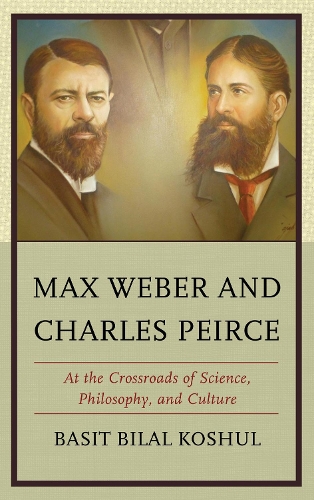
Max Weber and Charles Peirce: At the Crossroads of Science, Philosophy, and Culture
(Paperback)
Publishing Details
Max Weber and Charles Peirce: At the Crossroads of Science, Philosophy, and Culture
By (Author) Basit Bilal Koshul
Bloomsbury Publishing PLC
Lexington Books
14th November 2016
United States
Classifications
Professional and Scholarly
Non Fiction
Philosophy: logic
Western philosophy from c 1800
301.0922
Physical Properties
Paperback
240
Width 151mm, Height 230mm, Spine 17mm
358g
Description
Max Weber and Charles Peirce: At the Crossroads of Science, Philosophy, and Culture shows that a relational conception of science is implicit in Max Webers reflections on scientific inquiry as a bridge between the Geisteswissenschaften (soft sciences) and Naturwissenschaften (hard sciences). Because he is not a trained philosopher, Weber does not have the precise philosophical language in which to articulate his ideas clearly. Consequently, his relational vision of science remains obscure. Basit Bilal Koshul brings clarity and precision to Webers insights using the pragmaticist philosophy of Charles Peirce. He makes explicit the phenomenology, semiotics, and logic that are implicit in Webers methodological writings and translates them into Peircean terms. Since Peirce explicitly offers his philosophy of science as a critique of the modern divide between the humanistic and natural sciences and of the divide between religion and science, this translation has a double effect. It clarifies Webers insights on the methodology of scientific inquiry, and it extends the reparative force of these insights into the larger culture of which science is one part. The reconstruction of Webers relational conception of science along the lines of Peirces pragmaticism, in turn, reveals that Webers work points toward deep affinities between religion and science. Given the fact that the same phenomenology, semiotics, and logic that underpin Peirces philosophy of science are also at the root of his philosophy of religion, we can begin to appreciate the fact that Webers work makes an important contribution to bridging the divide between religion and science. In providing models that bridge divides and move towards complementary relationships, Weber and Peirce not only help us to better understand disenchantment as the fate of our times, but also offer uniquely valuable resources to reach for cultural horizons that lie beyond it.
Reviews
Basit Bilal Koshul's analysis of Max Weber's work makes significant contributions to the Weberian scholarship and dispels many prior unilateral readings of the Weberian corpus in at least these three areas: (1) Showing how much Max Weber was a post-modernist before post-modernism, a critic of Western modern cultural biases who didn't succumb to either an easy evolutionist bias or a simplistic optimismincluding in relation to capitalism; (2) Demonstrating the depth and complexity of the Weberian epistemology, including a critique of old assumptions regarding Weber's concept of science as "value free"; and (3) Dissecting the Weberian concept of disenchantment of the world in a way that allows, on the one hand, for a novel, more optimistic approach to the relations between science and religious faith, and, on the other hand, for a rather pessimistic probe of the relations between religion and modern Western capitalism. -- Otto Maduro, Drew University
Author Bio
Basit Bilal Koshul is associate professor at the Lahore University of Management Sciences (LUMS) in Lahore, Pakistan. After teaching at Concordia College in Moorhead, MN for four years, he joined the Department of Humanities and Social Sciences at LUMS in 2006. The focus of his research is to recover the neglected resources in modern thought and religious tradition (especially scripture) that can help to transform the mutually debilitating dichotomies of religion/science, North/South, West/Islam, economics/ethics, security/rights etc. into mutually enriching relationships. He sees the work of Muhammad Iqbal, Charles Peirce, and Max Weber, individually but much more so collectively, as a promising starting point for initiating the transformation of divides into relationships.
